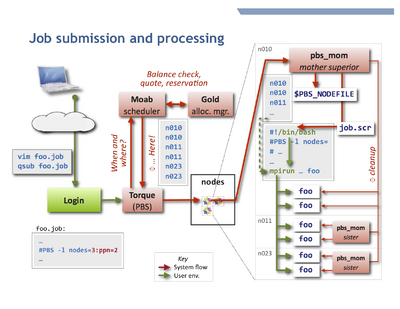HPC/Submitting and Managing Jobs/Example Job Script

Introduction
A Torque job script is usually a shell script that begins with PBS directives. Directives are comment lines to the shell but are interpreted by Torque, and take the form
#PBS qsub_options
The qsub man page describes the command options and the environment variables provided to the job at execution.
- Note
- Torque ignores directives after the first executable statement in the script. Place directives at the beginning of the job script. Empty lines are allowed, but not recommended. Best practice is to have a single comment-block at the beginning of the file.
- Advanced usage
- The job script may be written in any scripting language, such as Perl or Python. The interpreter is specified in the first script line in Unix hash-bang syntax
#!/usr/bin/perl, or using the qsub -S path_list option. - The default directive token
#PBScan be changed or unset entirely with the qsub -C option; see qsub, sec. Extended Description.
Example job file
Here are a few example jobs for the most common tasks. Note how the PBS directives are mostly independent from the type of job, except for the node specification.
OpenMPI, InfiniBand
This is the default user environment. The openmpi and icc, ifort, mkl modules are preloaded in the system's shell startup files.
The InfiniBand fast interconnect is selected in the openmpi module by means of the environment variable $OMPI_MCA_btl.
#!/bin/bash
#
# Basics: Number of nodes, processors per node (ppn), and walltime (hhh:mm:ss)
#PBS -l nodes=5:ppn=8
#PBS -l walltime=0:10:00
#PBS -N job_name
#PBS -A account
#
# File names for stdout and stderr. If not set here, the defaults
# are <JOBNAME>.o<JOBNUM> and <JOBNAME>.e<JOBNUM>
#PBS -o job.out
#PBS -e job.err
#
# Send mail at begin, end, abort, or never (b, e, a, n). Default is "a".
#PBS -m ea
# change into the directory where qsub will be executed
cd $PBS_O_WORKDIR
# count allocated cores
nprocs=$(wc -l < $PBS_NODEFILE)
# start MPI job over default interconnect
mpirun -machinefile $PBS_NODEFILE -np $nprocs \
programname
- If your program reads from files or takes options and/or arguments, use and adjust one of the following forms:
mpirun -machinefile $PBS_NODEFILE -np $nprocs \
programname < run.in
mpirun -machinefile $PBS_NODEFILE -np $nprocs \
programname -options arguments < run.in
mpirun -machinefile $PBS_NODEFILE -np $nprocs \
programname < run.in > run.out 2> run.err
- In the last form, anything after
programnameis optional. If you use specific redirections for stdout or stderr as shown (>, 2>), the job-global filesjob.out, job.errdeclared earlier will remain empty or only contain output from your shell startup files (which should really be silent), and the rest of your job script.
OpenMPI, Ethernet
To select ethernet transport, such as for embarrasingly parallel jobs, specify an -mca option:
mpirun -machinefile $PBS_NODEFILE -np $nprocs \
-mca btl self,tcp \
programname
Intel-MPI
Under Intel-MPI the job script will be:
#!/bin/bash
#PBS ... (same as above)
cd $PBS_O_WORKDIR
mpiexec.hydra \
-machinefile $PBS_NODEFILE \
-np $(wc -l < $PBS_NODEFILE) \
programname
The account parameter
The parameter for option -A account is in most cases the CNM proposal, specified as follows:
cnm123- (3 digits) for proposals below 1000
cnm01234- (5 digits, 0-padded) for proposals from 1000 onwards.
user- (the actual string "user", not your user name) for a limited personal startup allocation
staff- for discretionary access by staff.
You can check your account balance in hours as follows:
mybalance -h
gbalance -u $USER -h
Advanced node selection
You can refine the node selection (normally done via the PBS resource -l nodes=…) to
finely control your node and core allocations. You may need to do so for the following reasons:
- select specific node hardware generations,
- permit shared vs. exclusive node access,
- vary PPN across the nodes of a job,
- accommodate multithreading (OpenMP).
See HPC/Submitting Jobs/Advanced node selection for these topics.